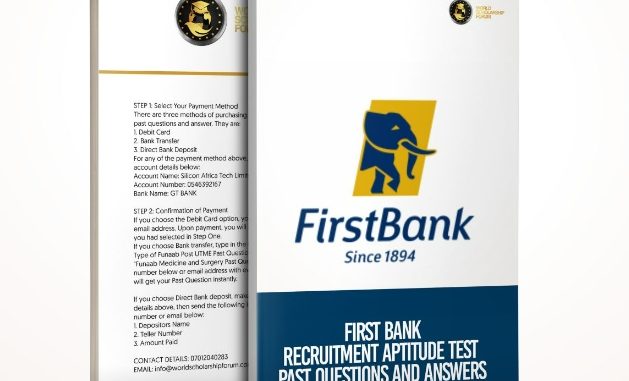
First Bank Recruitment Past Questions & Answers: Are you among the applicant who applied for First Bank recruitment? if yes then you are in the right place. in this article today, we will show you how you can pass the first Bank job Aptitude test with the help of the past questions which we have source out from previous years that will enable you to succeed in the exams read below you will have details on how to download the past questions without stress. you can also Download Zenith Bank Jobs Past Questions And Answers | Free PDF

Download First Bank Jobs Questions And Answers PDF
This book is a collection of aptitude test questions and answers collated from previous recruitment exercises of the First Bank Nigeria Plc. It is regularly updated with recent questions as made available by our partners in different recruiting agencies all over the federation.
You don’t need An Encyclopedia to pass first-bank work aptitude tests, you need a Condensed and straight-to-point First-bank sample of past questions, and Answer the WARRING YOU Progress.
First Bank Past Questions & Answers PDF
This book will benefit candidates who are invited to the bank’s aptitude screening test, as it will allow them to plan accordingly. This book is revised and reviewed particularly for the 2019 Graduate Trainee Aptitude Exam. We also have Questions and Answers from Banks Interview that will allow candidates to provide expected answers to questions during an interview with the bank.
Questions for this test are derived from these core areas:
- Verbal Reasoning
- Comprehension
- Critical reasoning
- Basic Mathematics
- Current Affairs
- History
- Common Knowledge
SAMPLE QUESTIONS For First BANK Aptitude Test
Crude oil (also known as petroleum) is a type of fossil fuel found beneath the earth’s surface. It is formed by the gradual build-up of fossilized organic materials such as algae and plankton. As more layers build up, the bottom-most layers are heated and subject to pressure, with the combination of heat and pressure leading to the matter transforming into the waxy substance kerogen. Following even more prolonged exposure to heat and pressure, the kerogen eventually becomes transformed into liquid and gases via the catagenesis process. The formation of crude oil occurs from this pyrolysis (heating) process. The range of heat at which kerogen becomes crude oil is called the oil window. Below this range, the crude oil remains kerogen and above this point, the crude oil becomes a natural gas.
1. If the temperature is too low, crude oil remains in a solid-state, whereas if it is too hot, it becomes a gas.
A. True
B. False
C. Can not tell
2. Crude oil is non-renewable.
A. True
B. False
C. Can not tell
3. Kerogen becomes crude oil after further heating and pressurisation in the catagenesis process.
A. True
B. False
C. Can not tell
4. The creation of crude oil takes place over many 100 000s of years.
A. True
B. False
C. Can not tell
5. Oil can also be produced from plant matter such as olives and sunflower seeds.
A. True
B. False
C. Can not tell

Leave a Reply